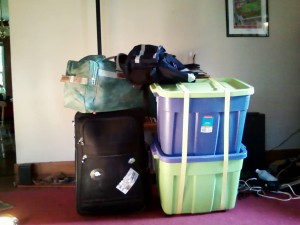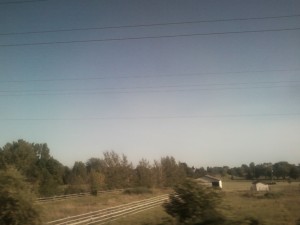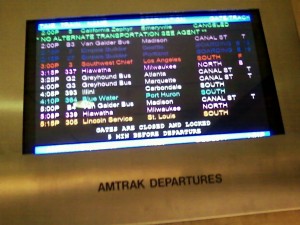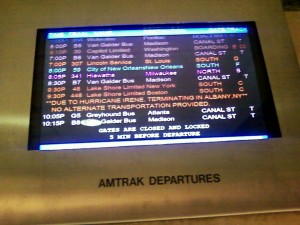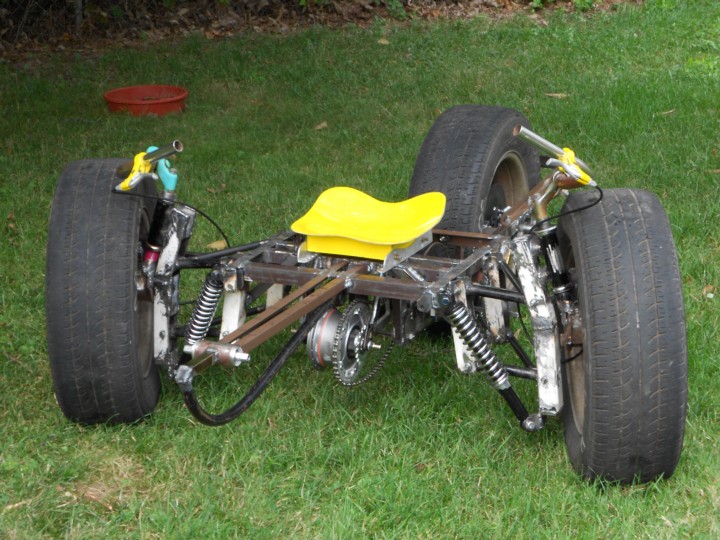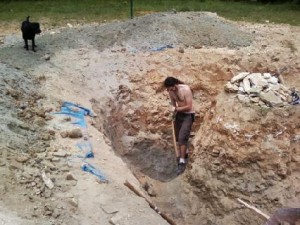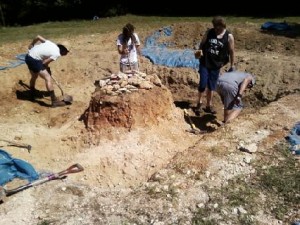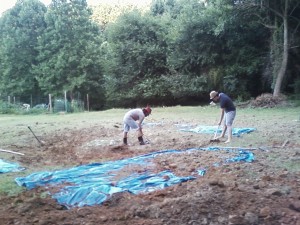Last Friday I headed out on JetBlue on my way to Las Vegas for my brother's 40th birthday. The last time I got on a plane was in October, 2001 for his 30th in Denver, and I've avoided it because of all the security insanity I kept hearing about. I didn't have any trouble, except that I left all kinds of identifying bangles and baubles at home — no LED ring, no Leatherman tool, no fun custom-made electronics of any kind. And I selected JetBlue because I heard they were pretty good. Indeed inflight services were perfectly adequate. They also brag about how much legroom they offer, but coming from riding Amtrak, I could not fathom having any less legroom — presumably my knees would be the backrest for the person in front of me.
I amused myself during the flight by using the in-flight locator channel (on the seat-back video) to identify interstates I had travelled on my way to and from Burning Man, barely able to recognize the moving semis from 7 miles above. Anyway, we did arrive late enough that I missed the Friday night show my brother was attending (for the second time in my life, I was delayed to change a tire on the plane, an occurrence I calculate must happen about 20% of the time.) Nonetheless, I got checked in to The Excalibur Hotel and Casino (3850 Las Vegas Boulevard South, Las Vegas, NV) and settled in. My brother gambles enough that his mLife card (tied to all the MGM properties) gained him free hotel rooms for himself and for me. The room was unfortunately not as luxurious as I had come to expect, but it was nonetheless comfortable (akin to a Holiday Inn room with no coffee maker) and it had an excellent view of the strip. When I got together with him and his friends, we headed out and stopped at Diablo's Mexican Cantina at the Monte Carlo (3770 Las Vegas Boulevard South, Las Vegas, NV) for some drinks and so I could get something to eat. Food cost about twice as much as it does in Rochester, but any at that price was consistently very good, and I stuck to drinking non-alcoholic beer which hovered around $6 with tip per bottle.
Saturday was my brother's birthday and we had sushi for lunch. Three of us did one of the green-screen lipsynch videos at a kiosk which ended up looking quite amusing. That night we saw Zumanity in The New York New York Hotel and Casino (3790 Las Vegas Boulevard South, Las Vegas, NV) — an adult-themed Cirque du Soleil show. It was fantastic. Although for the most part I was mesmerized by beautiful bodies (mostly exposed if you must ask) performing astounding feats, I was enchanted by the story in the "Tissus" segment with a man swinging on silky ribbons attempting to catch the attention of his muse. At the climax when they both go flying off I inexplicably teared-up, finding the whole thing wonderful.
Once we got done with the show we headed to one of the newest casinos on the strip and selected a place to eat: Scarpetta at The Cosmopolitan (3708 Las Vegas Boulevard South, Las Vegas, NV). As it was very expensive and fancy, I opted to have a dish I didn't recognize: "moist-roasted capretto" described only as "rapini, pancetta & potatoes". For my fellow philistines, it's goat (presumably baby goat, as Google Language Tools kindly translates the phrase "moist-roasted kid") in a zesty sauce not unlike a brown gravy. (It was further refreshing to worry not about bones as I usually do eating such animals at Indian restaurants.)
My brother's and my regular haunt was Dick's Last Resort at the Excalibur (3850 Las Vegas Boulevard South, Las Vegas, NV). They were generally okay, and (as the Excalibur was among the cheapest hotels on the strip) the crowd was plentiful and rowdy. In any case, once it was just my brother and I, we did a tour of the strip, starting at The Wynn Hotel and Casino (3131 Las Vegas Boulevard South, Las Vegas, NV) — an astoundingly decorated place — where we got breakfast at The Pizza Place there. I had an excellent oatmeal (a refreshing change) and my brother had a perfectly prepared egg/bacon/cheese breakfast sandwich on a giant croissant. On our way back, we got to see a short but impressive show of the famous fountains at The Bellagio Hotel and Casino (3600 Las Vegas Blvd South, Las Vegas, NV).
My brother left mid-day on Tuesday, and I was there until late at night for the red-eye back to New York. Although everything we saw and did was flashy and impressive, it was solely done for the love of money. I was pretty okay for the first couple days, but the whole soullessness of it all drove me nearly mad by the middle of Tuesday. I was biding my time trying not to gamble (I lost about $50 in all, so not too bad, I guess) by sitting out in the warm weather and reading Great Expectations (for the first time as an adult not for any school). I talked with this guy for a bit on the street and he claimed to be England's first rapper — one Raymond Witter (also an author on LuLu) and he was one of a few who wasn't outright selling something.
Earlier in the week, I met a woman who seemed friendly enough, but I was led away from her on suspicion that she was actually a prostitute. I didn't believe it, but on the last day, I met another woman at another casino and after a too-brief chat, she offered to "go upstairs". It was so sad to not be able to make any human connection (save for other vacationers and a few chatty bartenders) … except, presumably, for money. The "alluring façade over emptiness" theme is echoed right down to the thin veneer of the Las Vegas strip over a burnt-out city (which I explored a little of on a morning run on Monday) that only supports the constant construction of its appearance and, apparently, the numerous office furniture stores needed to accomplish that end.

